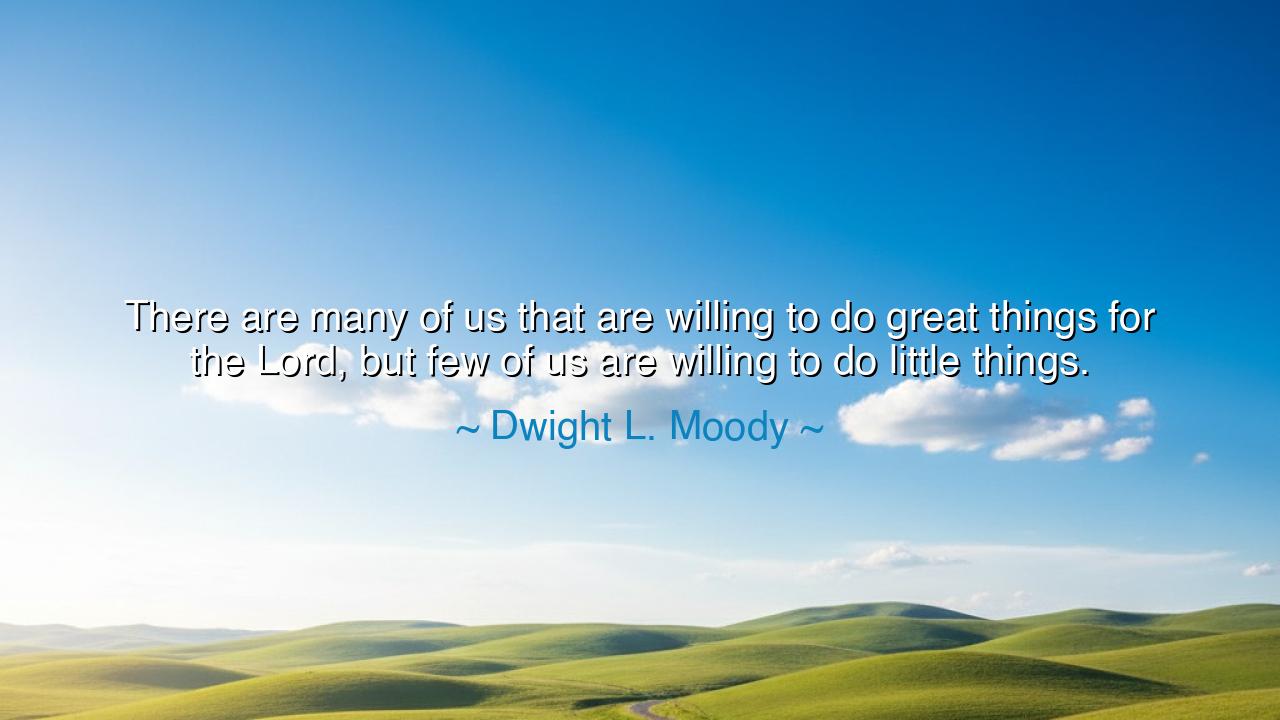
There are many of us that are willing to do great things for the
There are many of us that are willing to do great things for the Lord, but few of us are willing to do little things.






In the quiet power of simplicity, Dwight L. Moody once declared: “There are many of us that are willing to do great things for the Lord, but few of us are willing to do little things.” These words, though spoken in the humble age of revival and faith, ring through eternity like the chime of a temple bell — steady, piercing, unchanging. In them lies a lesson not only for the believer, but for every soul that seeks greatness: that true devotion is not proven in the thunder of mighty deeds, but in the whisper of faithful humility.
To understand this, we must remember that greatness has never been measured by the scale of the act, but by the spirit in which it is done. The ancients knew this well — that the most sacred service is not the one performed before the eyes of many, but the one performed unseen, out of pure love and duty. Moody, a preacher whose heart burned with compassion for the common people, saw how many longed to do something grand — to lead, to be known, to perform miracles of renown. Yet, how few were willing to stoop to the smallest acts: to comfort a stranger, to sweep a floor, to serve in silence. He saw that the true path to divine greatness is paved with small stones, laid one by one through patience and humility.
Consider the story of Mother Teresa, a woman who, centuries after Moody, lived the very truth of his words. The world came to call her great — a saint, a symbol of mercy — yet her greatness was not born of a single grand act, but of countless small ones. Day after day, she bathed the sick, fed the dying, and whispered words of comfort to the forgotten. “Not all of us can do great things,” she said, “but we can do small things with great love.” This is the spirit Moody spoke of — the sacred willingness to serve in obscurity, to find holiness in the humble, and to recognize that the smallest act of kindness carries eternal weight.
The ancients taught that the proud heart seeks glory, but the wise heart seeks goodness. Even the mighty kings of old understood that power without humility is ruin. When Marcus Aurelius, the philosopher-emperor, ruled over Rome, he wrote in his meditations that one must not despise the simple duties of life — to help, to listen, to endure. “What is divine,” he said, “is modest and content with what is small.” He, like Moody, saw that the true servant of the higher purpose is not he who waits for applause, but he who does the necessary thing, however small, with steadfast love.
In Moody’s words lies also a warning to the restless spirit of humanity — our hunger for recognition, our desire to be seen as great in the eyes of others. We long to build monuments, to lead armies, to make history. Yet the divine, and indeed the moral, asks something quieter: to be faithful in the ordinary. To give a drink of water. To forgive when none are watching. To speak kindly when it costs us nothing, and to remain true when it costs us everything. For the little things, done consistently and with love, are the roots from which all great things grow.
And so, the meaning of Moody’s wisdom is this: if you wish to serve the highest good — whether you name it God, truth, or love — begin not with the grand, but with the near. Begin where you are. Wash the feet of the weary. Tend the wounds no one else sees. Offer the smile that softens another’s burden. These are not lesser deeds — they are the foundation of all greatness. For the one who is faithful in small things is prepared, when the time comes, to be faithful in great ones.
Let the lesson be clear to all who hear: greatness begins in humility. Seek not to be admired, but to be useful. Seek not to shine before men, but to serve before heaven. For the river that carves mountains begins as a quiet stream; the flame that lights the world begins as a single spark. Let your life, then, be a series of such small flames — acts of love so simple, yet so constant, that they become a fire of goodness that no darkness can quench.
And thus, as Moody’s words remind us, there is no act too small to be sacred. Every humble deed, done in love, becomes part of the eternal. Do the little things, my friend, with a great heart — and in time, you will find that you have done something truly great.






AAdministratorAdministrator
Welcome, honored guests. Please leave a comment, we will respond soon